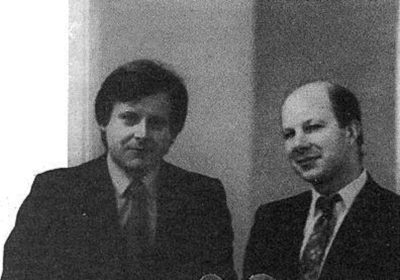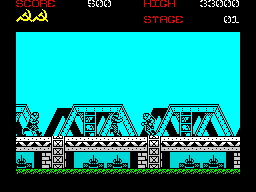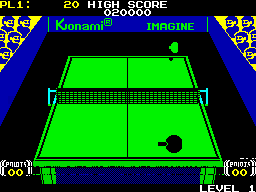
Once Imagine of Liverpool and Ocean of Manchester were big rivals. After the spectacular collapse of the former, Ocean took over the title and material goods of Imagine to become undoubtedly one of the largest games software houses in Europe. Since then they have had their ups and downs, gaining a reputation for heavy promotion and for not always sticking to their release dates. In its time, Ocean has put out a mixed bag of games but has scored with many genuine successes and never been frightened off by difficult concepts like FRANKIE GOES TO HOLLYWOOD. To investigate what the new Imagine is like and how it relates to its new parent, Julian Rignall went up to Manchester to chat to DAVID WARD and COLIN STOKES, two of the men behind the hype.

Unlike the old Imagine’s magnificent Liverpool edifice, Ocean’s Manchester HQ in Central Street is surprisingly modest, both in size and appearance. It seemed appropriate that the first person I spoke to should be Colin Stokes, who had once been part of the old Imagine and I started by asking him whether the reputation of the original Imagine had caused any difficulties for Ocean, but he didn’t think so. ‘People didn’t say, “let’s hide. We don’t want your products, we’ve already got thousands in our warehouse”, they just took it as another opportunity to sell software and make a profit.
‘Viewing Imagine as an experience, a sort of closed chapter, I found myself thinking “who else is going to be the mega company.” So when I went knocking on doors saying, “here I am, I’m an Imagine representative again,” I didn’t find one person who said “Well, I’ve got 10,000 Whacky Waiters in my warehouse. Can I give you them back before we talk?” It was all very friendly.’
But wasn’t Ocean worried that the famous name carried a taint with it? Why buy it?
‘You say, “what’s up for grabs, is there anything which will be of use to us?”. After all, with all the advertising, whether good, bad or indifferent, it was a market name that was known and you have to have been on Mars not to have known the name of Imagine, so it was already established. The difficulty was whether you considered it as a Titanic — was it worth raising or not?’
Certainly the first game Ocean released under the new Imagine label was worth it, as Colin recalls. ‘World Series Baseball was a good product and that was one of the games made available by the liquidators — there wasn’t another like it around — the graphics were very good. Then Hypersports came along which got good reviews.’
The whole thing took off very suddenly, though. There was no slow build-up and months of advertising as we have now come to expect. I asked Colin what was going on at Imagine during that period?
‘I think that the hype was the actual link-up with the Ocean group and Konami. That really set the scene, because if everyone knew what Konami was all about they’d realise that there was some really high-calibre products amongst it all. When you do a deal you look at the goodies and the baddies. You always get one or two weak titles in a deal, but we looked at Hypersports as being the real blockbuster.’
Imagine produces virtually every game for the three main machines, Spectrum, Commodore 64 and Amstrad. With so much product in the pipeline and each one being triplicated, Imagine must be facing all sorts of problems. What exactly goes on when a title is developed?

One of the current Konami conversions currently underway at Chateau Imagine — GREEN BERET. It’s a combat game viewed from the side rather than above
‘We try to keep the best titles in-house so we can have a day-to-day viewing on how the programmers are getting on, but if you appreciate the size of our operation with US Gold, Imagine and Ocean you really do have to contract out. We have up to sixty programmers contracted out at one time which is very, very tough to co-ordinate. You take Mikie, Comic Bakery, Ping Pong, Yie Ar Kung Fu — on all three machines, twelve formats in all with sometimes two people working on a title, so already there are twenty four people working on those titles alone. It’s quite a difficult thing to monitor!’
Ocean’s managing director, David Ward, is evidently pleased that they act as a publishing and marketing house for so many varied programmers (Ocean were heavily responsible for helping Denton Designs get going), and he pointed out that this trend is escalating. ‘Increasingly we find ourselves looking for people who like to call themselves software houses, but aren’t interested in actually marketing the game. So they can be in Somerset, Scotland or wherever and we can publish the game for them. We must have programmers in just about every county in Britain.
‘When we started in the old days of mail order where you put an advert in Your Computer and waited until the next Tuesday and hoped there would be some replies, put them in a jiffy bag and off they’d go, at that time programmers would be working in their attic after school, but now it has become far more sophisticated. First we got about twenty people aboard, and most of them stuck with us. My guess is that by Christmas we’ll have about 100-120 programmers working for us, especially now with all the Ultimate games, Ocean’s bigger title range and Imagine’s arcade label. You see, while we’re open for people to be able to walk in the door we’re always open for new ideas. The programmers and coders are the creative aspect of the industry — anyone can go around licensing titles. What you have to have at the end of the day is some sort of intellectual property which we then publish.’
But licenced arcade conversions bring with them their own problems, as Colin pointed out. ‘The hardest thing is reference — for example Yie Ar Kung Fu was referenced directly from the arcade machine.’ This means the programmers actually have access to an arcade machine in their offices, but if a development team on another machine happens to live in Scotland, then as soon as the in-house team have finished with the arcade machine, it has to be shipped off. The delays start...
How about Knight Rider and Street Hawk, I wondered, and asked Colin what had happened to them?
‘With a conversion you designate three months, give or take a few weeks, and, unless there’s a major bug found, twelve weeks usually suffice. The guy who was doing it spent three months, then four, then five. Now, what do you do as a commercial company? What happens is that you have to gear your advertising to the date that the programmer tells you. You go up and book X amount of space in magazines, and you’ve got the programmer sitting there and you say, “do you promise that the game is going to be finished by then?” and he says, “no problem.” What are you supposed to do? There are only a limited amount of carrots that you can dangle in front of them.’
One programmer, it seems, became so fed up with his assignment that he asked to be removed from the project after four months delay. His removal, however, led to new programmers having to entirely rewrite the code, starting all over and causing more delays. As Colin said, ‘It doesn’t do the company or our image or relationship with the big stores one iota of good. We’re always very susceptible to this sort of situation. Knight Rider and Street Hawk were the same.’
Colin emphasised the size of their forthcoming schedule; Ping Pong, Superbowl, Batman, V, Green Beret, Knight Rider, They Sold a Million II and Street Hawk!
‘As you can see,’ he added optimistically, ‘it’s quite a task really, but we’ll pull through!’
With arcade conversions, it seems they are not very free to interpret the originals, on this point Colin was firm. ‘We’re not allowed to be distracted from the original. We do have to follow the program exactly and I can’t say, “this is a little weak in this section let’s change it”.’
I asked whether the programmers felt tied down by this rather hefty ruling?
“Yes, they do. The contract that we have is obviously very lucrative, Konami are the best for arcade programs and we’re very glad to be on board with them. So if part of the deal is that you produce the product as per original we’re pleased to do so. We’re just a vehicle for converting the games to the home micro, we can’t show our own expression, that’s the deal. The programmers come in and say, ‘I’d like to do this and that,” but if it distracts from the original I have to answer no. We can’t produce a game until they (Konami) have looked at it. It can have you sitting on the edge of your seat in fact!’

Another arcade game finding its way onto the Spectrum at IMAGINE: PING PONG, again from Konami
Conversions aren’t everything, however, in fact the CRASH Smashed Movie was a surprise event, as Colin explained. ‘The programmer originally came over to Britain from Yugoslavia to see Bug-Byte because they owed him some royalties, but when he knocked on their door it was all barred up with a sign saying closed. It was suggested to him that he should come up here to see whether we could help him out in any way and he came up with two quite abysmal products. I felt sorry for him because he didn’t even have his plane fare home so I took them off him just so he could get home. Because we’d been kind to him he felt obliged to us and we got a parcel through the post. I looked inside and said, “wow, this will do very nicely thank you!” I phoned him up and we made a deal over the phone!’
Movie is the name of an original game, but to Ocean/Imagine the game is in licensing, and many future plans lie in film tie-ins — Rambo was a classic example. How difficult is it to grab the rights? ‘I’m afraid it’s a boring answer, it’s a question of strength. If you go to the agent and say we want to produce a game we have to assure them that we’re not going to bring our friend with the muscles down and because of the size of the company and the market presence you stand more of a chance pitching in and getting it than a lesser company.’
So how do Ocean and Imagine see the future? David Ward: ‘We’re always trying to broaden our horizons of both the type of games we sell and the age group we’re aiming at so we can get the largest possible audience.’ Colin Stokes: ‘It’s a very fickle industry. There are no guarantees for the software houses and there are none for the distributors, so who would be brave enough to predict what’s going to happen this time next year? After Green Beret is out of the way, we’ll take a deep breath and look again. We’ve got enough plans to get us through to March 1987, it’s just a question of how we go about it. You’re only ever as good as the quality of your games and we have to move with the times.’